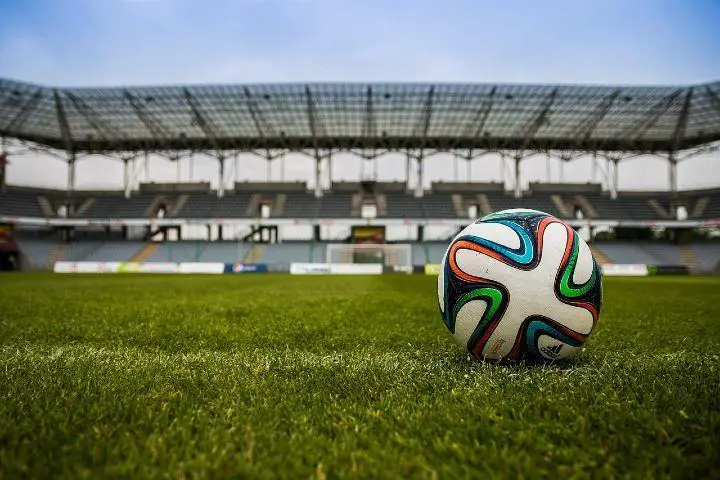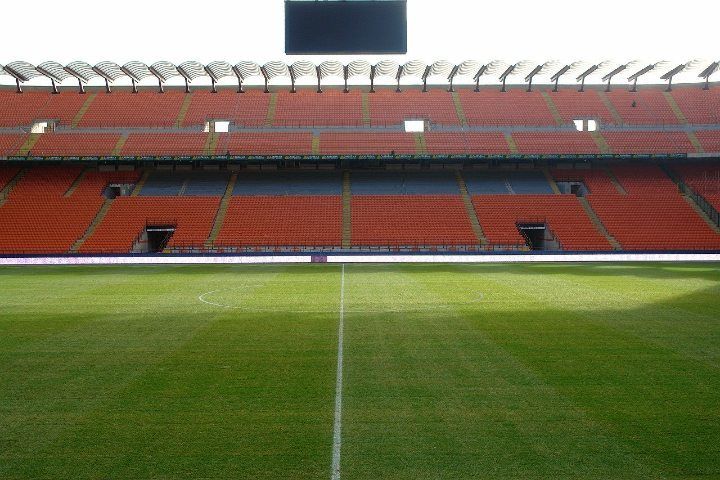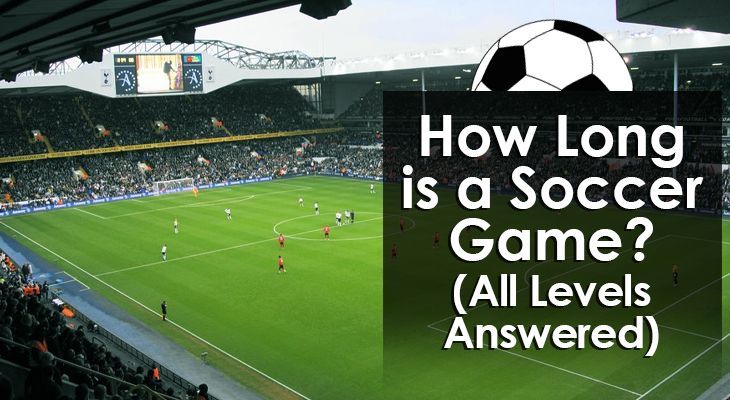How Long is a Soccer Game (All Levels Answered)
While friendly kickabouts can be as short or as long as you like or have time for, organised soccer matches in a league or at a club last a specific amount of time.
So, just how long is a soccer game?
This ranges from 90 minutes for adults to just 20 minutes for the youngest age groups.
Matches will last longer as the players grow, develop, and increase their skills.
Whether you are a coach, player, or parent it’s very important to know just how long the match you, your team, or your child is going to play.
To help you out, here are the lengths of soccer games for all levels and ages with extra time, half time, and breaks also explained.
Let's first start off with the pinnacle of the sport, so the professional game, before working our way down through the age groups.
How Long is a Professional Soccer Game?
At the very highest level of the sport, professional teams around the world follow the “Laws of the Game” with Law 7 relating to the duration of a match.
This states that a match lasts for two equal halves of 45 minutes each.
So, a normal soccer match should last 90 minutes.
Each half is played continuously which means that the referee does not stop the clock whenever the ball goes out of play.
In between the two halves is a 15 minute break where the players can rest, take in fluids, and hear advice, encouragement, and tactics from their coach.
This is commonly called “half-time”.
Additional Time
At the end of each 45 minute half, the referee can also add on 'additional time'.
Usually referred to as stoppage time or injury time, these extra minutes make up for any time lost during the match.
This could be due to:
- Substitutions
- Players getting injured and needing assessment or removal from the pitch
- Time wasting (particularly if a team is defending a lead)
- Disciplinary sanctions (so if play keeps getting stopped due to fouls)
- Delays due to the referee checking VAR
- Drinks breaks or cooling breaks (these depend on the competition)
- Any other cause that leads to time being wasted (over the top goal celebrations for instance)
This stoppage time is usually signalled by a fourth official holding up a board on the sideline to let the players, coaches, and fans know exactly how much time has been added on.
When the teams are playing this additional time, the referee can always add to it if necessary but not decrease it.
If a penalty is awarded right at the end then the half is extended until it is taken.
It’s up to the referee to decide when the game ends by blowing their whistle.
Penalty Shootouts and Extra Time
While this all holds true for league matches, in certain cup or knockout competitions a clear winner is required.
This means that a game that ends in a draw may go straight to a penalty shootout or to a replay to be played at a later date.
Alternatively, the tied game may instead go into extra time.
This is when two further periods of 15 minutes each are played at the end of the regulation time with a short 5 minute break separating them.
If the match is still tied at the end of this extra time, the game goes to a penalty shootout to determine the winner and the team that goes through to the next round of the competition.
Each team takes 5 penalties, alternating between them, with a different player taking each shot. The team that scores the most out of their five wins the game.
If it’s still a draw after this, the two teams go to sudden death with each team taking a penalty until one player misses and the other scores to send their team through.
While most adult teams around the world follow the above rules and play 90 minute matches whether they are professional or not, some leagues do have shorter games depending on the level, age, and seriousness of the competition.
These matches could be just 70 minutes or an hour in length with a shorter break between the two halves.
As we will now see, the time it takes to play a match also varies considerably when it comes to youth soccer.
Let's take a look!

How Long is a Soccer Game for Kids?
With youth soccer matches many leagues, competitions, and countries have their own rules relating to how long each age group should play.
You should check with your club or local league if you want to be certain just how long your child or team is meant to play.
To give you an idea of the general length of a match at each level, we'll quickly go over what both the United States Youth Soccer Association and the Football Association in the United Kingdom recommend.
United States Youth Soccer Association
As the youth players are still growing and developing, the younger they are, the less time they play.
Over the years, they slowly increase the length of the games, the number of players and the size of the pitch until 17, 18, and 19 year olds are playing 90 minute matches on a full-size pitch.
At the earliest age groups, teams usually get around 5 minutes break between the quarters or halves with this rising to 10 minutes and then 15 minutes for the older players.
Age Group | Game Length | Overtime Periods |
|---|---|---|
6U – 8U | 4 – 10 minute quarters | None |
10U | Two 25 minute halves | None |
12U | Two 30 minute halves | Two 10 minute halves |
14U | Two 35 minute halves | Two 10 minute halves |
16U | Two 40 minute halves | Two 15 minute halves |
19U | Two 45 minute halves | Two 15 minute halves |
To highlight the slight differences between different soccer associations around the world in terms of what they recommend, let's now turn to youth soccer in the United Kingdom.
United Kingdom Football Association
Just as in the US, youth players in the UK start off on smaller pitches, with smaller balls, playing for shorter amounts of time.
As they grow and develop, they slowly work their way up to playing a full length match on a full-sized pitch.
Again, the half time break is generally around 5 or 10 minutes for the younger age groups with older playerS receiving the full 15 minutes rest.
Age Group | Minimum Duration of Play per Half | Maximum Duration of Play per Half |
|---|---|---|
U8 | 10 Minutes | 20 Minutes |
U10 | 20 Minutes | 25 Minutes |
U12 | 20 Minutes | 30 Minutes |
U14 | 25 Minutes | 35 Minutes |
U16 | 25 Minutes | 40 Minutes |
U18 | 25 Minutes | 45 Minutes |
As you can see, youth leagues in the UK have quite a bit of flexibility when it comes to just how long players at each age group play.
This means that it is a good idea to check with the coach, club or league, just how long your child or team is going to be playing.

Conclusion:
Well there you have it…
The question "how long is a soccer game?" has been officially answered.
The lengths of soccer matches for all different levels and age groups taking you from U6 right up to the highest level of the professional game.
While a 20-minute match may be more than enough for a youth player just starting out on their soccer journey, at the pinnacle of the sport players are expected to last 90 minutes with a tie going to extra time and a penalty shootout.
As we saw that the length of matches can vary considerably between different age groups, leagues, and countries.
So always make sure to check with your club just how long your child is expected to play before turning up!

